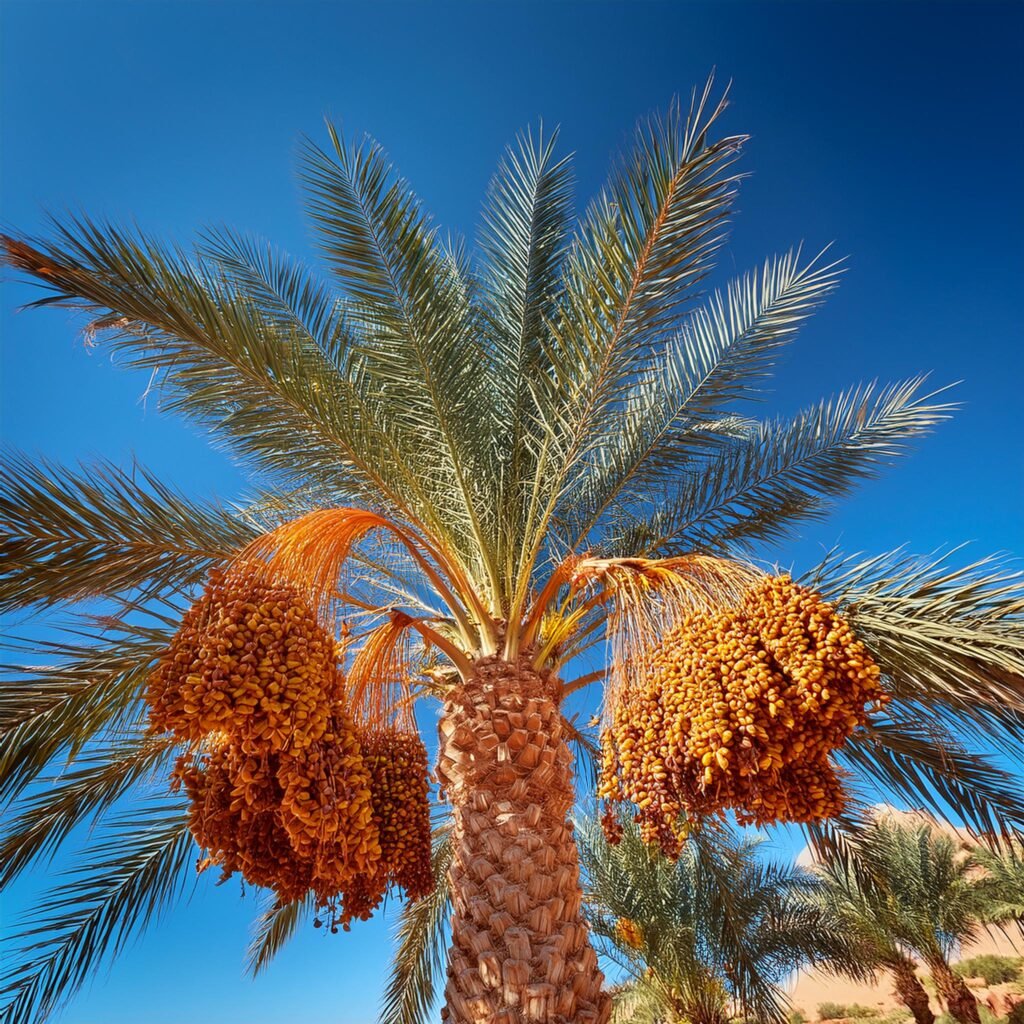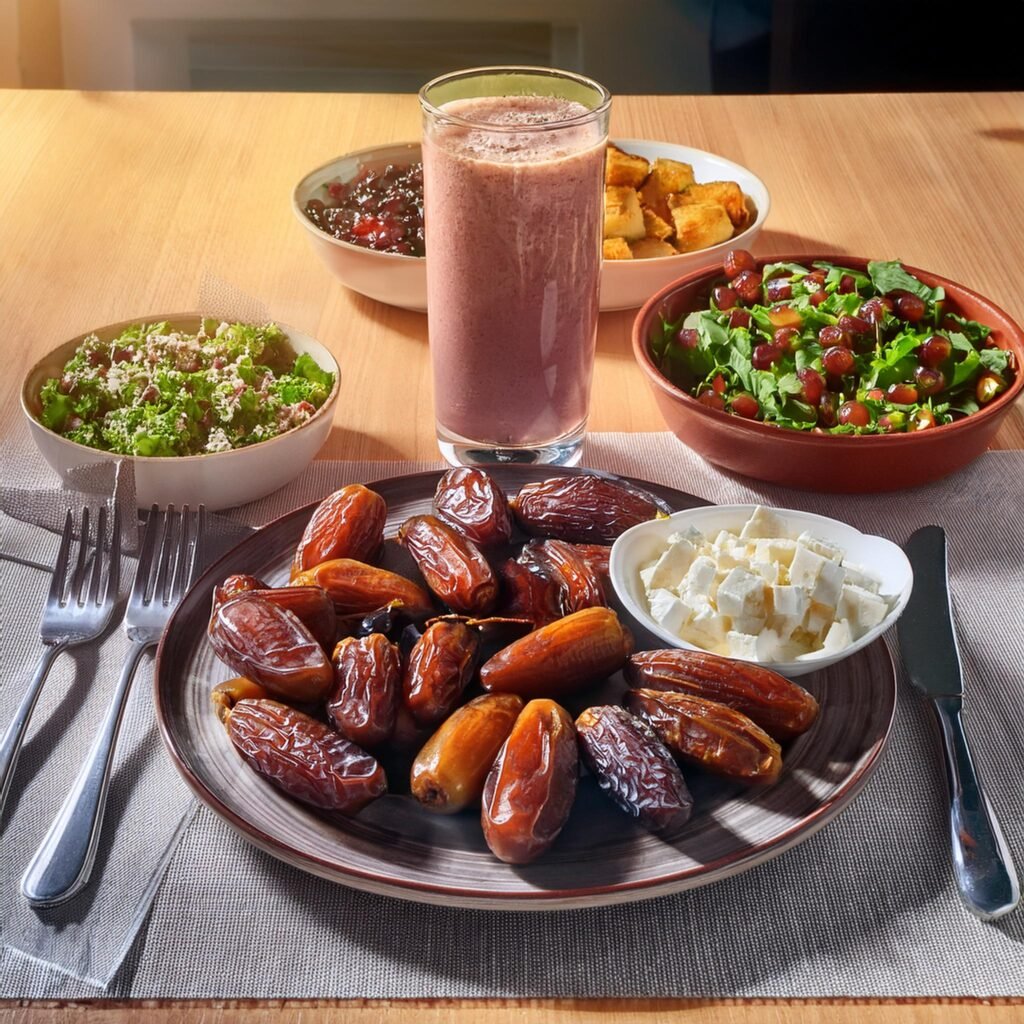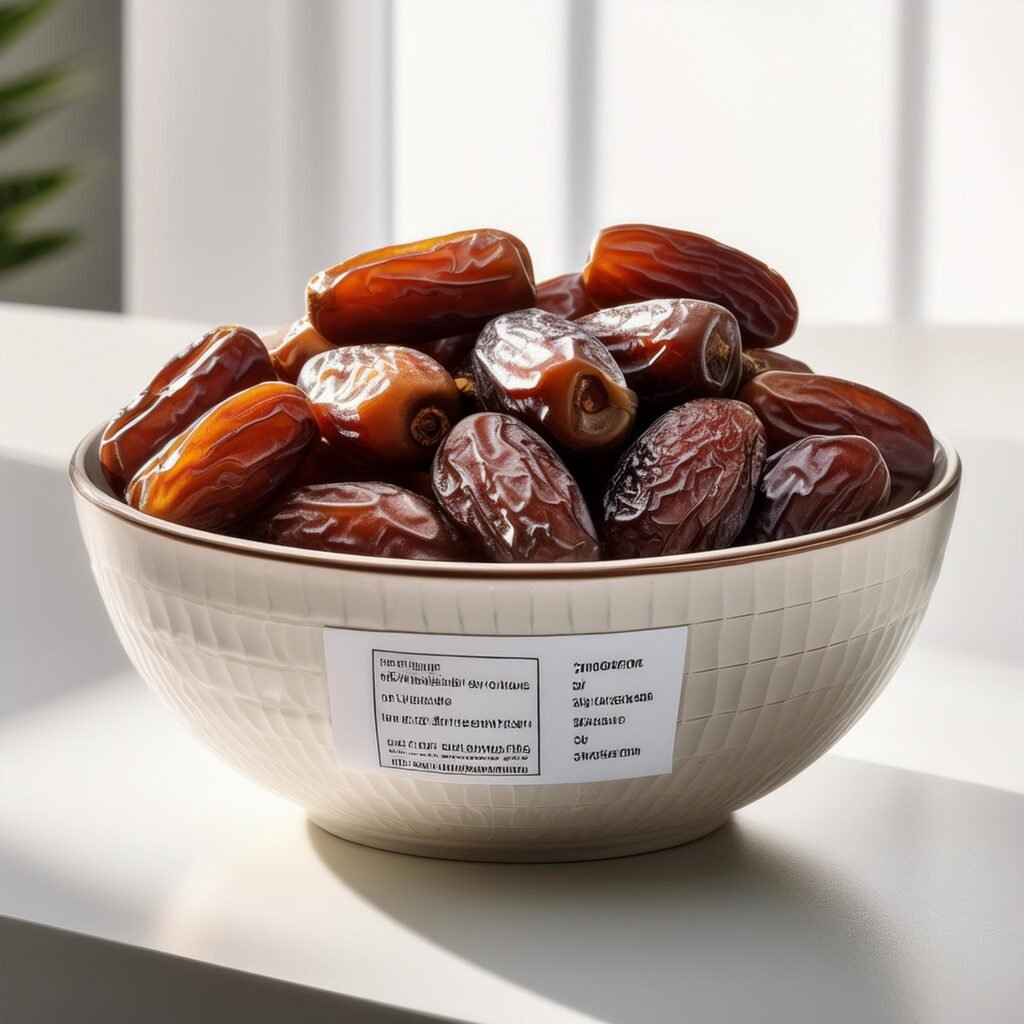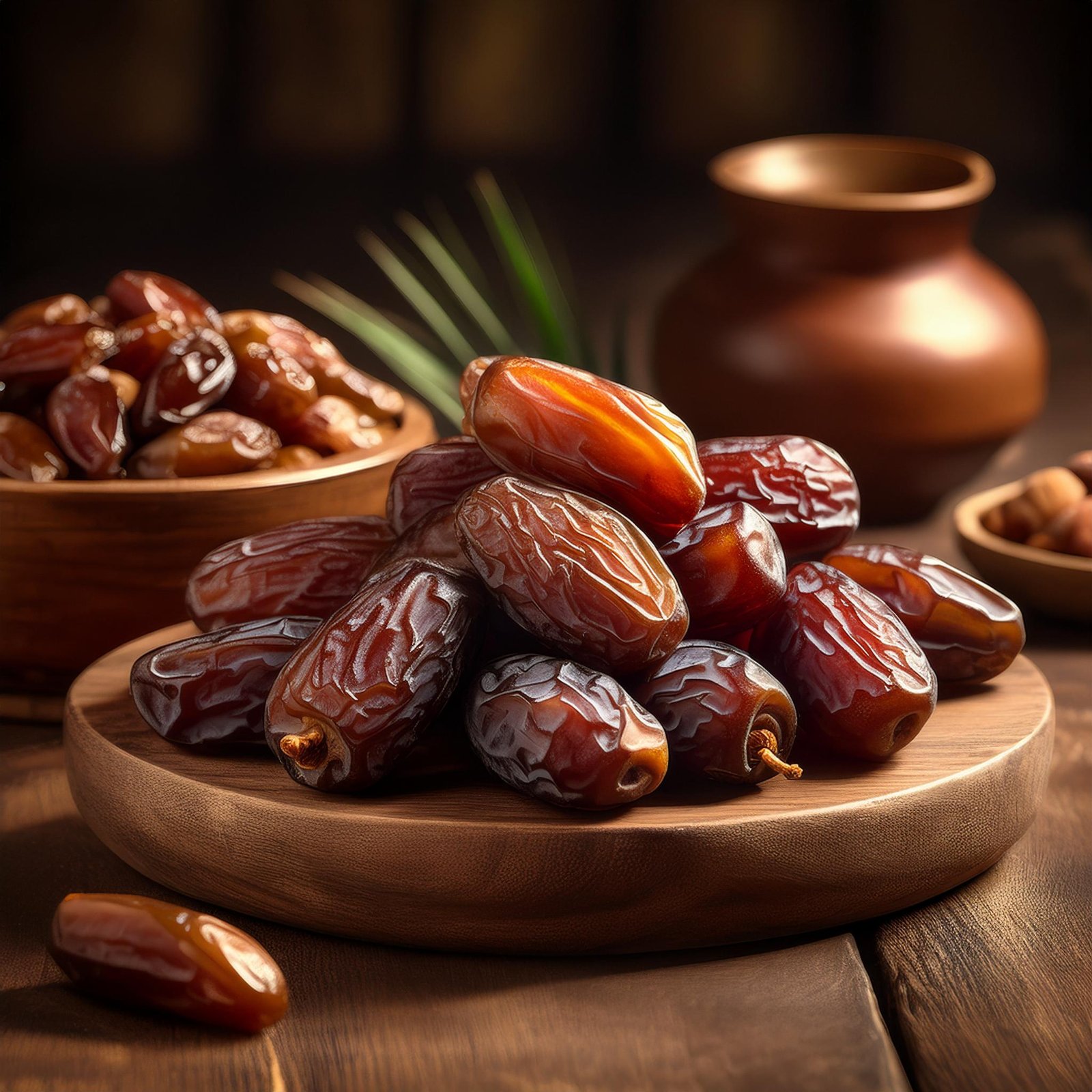What Does Date Palm Taste Like? Date palms, known for their luscious fruit, have been cultivated for thousands of years in the Middle East and North Africa. Their fruit, commonly referred to as “dates,” is celebrated for its natural sweetness, versatility, and nutritional value. Whether you’re enjoying them fresh, dried, or incorporated into dishes, the unique taste of date palms makes them a staple in many culinary traditions.
But what exactly does a date palm taste like? From the rich caramel notes of Medjool dates to the subtle sweetness of Deglet Noor, the flavor of date palm fruit varies depending on the variety, ripeness, and preparation.
In this article, we’ll explore the distinctive taste of date palms, their culinary uses, and why they’re a favorite among sweet and savory enthusiasts alike.
What Are Date Palms?

Date palms, scientifically known as Phoenix dactylifera, are ancient trees primarily cultivated for their edible fruit. These trees thrive in arid regions, particularly in the Middle East, North Africa, and parts of the United States like California and Arizona. The fruit of the date palm, commonly referred to as a “date,” is a staple in many cultures due to its versatility and natural sweetness.
The Fruit of the Date Palm
Appearance and Structure
Dates are oval-shaped fruits with a glossy outer skin that ranges in color from golden yellow to dark brown, depending on the variety and ripeness. Inside, they have a soft, sticky flesh surrounding a single elongated seed.
Varieties of Dates
- Medjool Dates: Known as the “king of dates,” Medjool dates are large, soft, and intensely sweet, with a flavor reminiscent of caramel and honey.
- Deglet Noor Dates: Smaller and firmer than Medjool dates, Deglet Noor dates are less sweet, with a more delicate, nutty flavor.
- Other Varieties: Halawi, Barhi, and Zahidi dates each offer unique taste profiles, ranging from buttery sweetness to tangy undertones.
Historical and Cultural Significance
The date palm has been a symbol of life and prosperity in desert cultures for thousands of years. Its fruit has served as a vital source of nutrition, trade, and cultural heritage. Today, dates are enjoyed worldwide as a healthy snack and a key ingredient in both traditional and modern recipes.
What Does Date Palm Taste Like?
The taste of date palm fruit is defined by its natural sweetness and rich, complex flavor. Let’s break down the general characteristics of date palm fruit and explore how specific varieties differ.
General Flavor Profile
Dates are naturally sweet with a flavor that often resembles caramel, honey, or molasses. Their texture can range from soft and chewy to firm and slightly crisp, depending on the variety and ripeness. The sweetness of dates makes them a natural alternative to refined sugar in many recipes.
Fresh Dates vs. Dried Dates
- Fresh Dates: Often lighter in sweetness with a juicy texture, fresh dates are less common but prized for their delicate flavor. They are typically golden or yellow and have a slightly tangy undertone.
- Dried Dates: The drying process concentrates the sugar content, making dried dates sweeter and chewier. They are the most widely available and versatile form of date palm fruit.
Unique Tastes of Popular Varieties
- Medjool Dates: These dates are soft, moist, and extremely sweet, with a flavor profile often compared to caramel or brown sugar.
- Deglet Noor Dates: Known for their subtle, less overpowering sweetness, these dates are firmer and have a mild, nutty flavor with a hint of dryness.
- Barhi Dates: Soft and creamy, Barhi dates have a unique butterscotch-like taste, making them a favorite for snacking.
- Zahidi Dates: Less sweet and slightly fibrous, Zahidi dates have a mild flavor that pairs well with savory dishes.
Culinary Uses of Date Palms

Date palm fruit is incredibly versatile, used in a variety of sweet and savory dishes around the world. Its natural sweetness and rich flavor make it a popular ingredient in both traditional recipes and modern culinary creations.
Sweet Applications
Dates are a natural choice for desserts and sweet treats, as their sugary profile complements a wide range of flavors.
1. Baking:
Dates are often used in cookies, cakes, and bread for added sweetness and moisture. Classic examples include sticky toffee pudding, date nut bread, and energy bars.
2. Smoothies and Drinks:
Blended dates can sweeten smoothies, milkshakes, or lattes naturally. Their caramel-like flavor pairs particularly well with chocolate, banana, or almond milk.
3. Energy Bites:
Dates are a key ingredient in no-bake energy bites, mixed with nuts, seeds, and cocoa for a quick and healthy snack.
Savory Applications
The sweet flavor of dates contrasts beautifully with savory ingredients, making them a unique addition to meals.
1. Pairing with Meats:
Dates are often stuffed with ingredients like almonds, goat cheese, or blue cheese and wrapped in bacon for a savory appetizer. They are also added to stews, tagines, or roasted meats for a hint of sweetness.
2. Salads:
Chopped dates provide a sweet counterpoint to greens, nuts, and cheeses in salads. Their chewy texture adds an extra layer of complexity.
3. Grain Bowls:
Dates can enhance grain-based dishes like quinoa, couscous, or rice pilaf, balancing savory spices with a touch of sweetness.
Traditional Uses
In Middle Eastern and North African cuisines, dates hold a prominent place:
- Stuffed Dates: A traditional treat during Ramadan, often filled with nuts or cream.
- Date Syrup: Made by reducing dates into a thick, molasses-like syrup, used as a natural sweetener in various dishes.
- Tagines and Stews: Dates are slow-cooked with lamb, chicken, or vegetables, infusing the dish with their sweet and tangy flavor.
Nutritional Value of Date Palms

Dates are not only delicious but also highly nutritious. Packed with essential vitamins, minerals, and fiber, they offer numerous health benefits.
Health Benefits
1. Natural Energy Source:
Dates are high in natural sugars like glucose, fructose, and sucrose, making them an excellent source of quick energy.
2. Rich in Dietary Fiber:
The fiber in dates supports digestive health and helps maintain blood sugar levels by slowing sugar absorption.
3. Loaded with Vitamins and Minerals:
Dates contain potassium, magnesium, iron, and B vitamins, which contribute to overall health, including improved heart health and boosted energy levels.
Replacing Refined Sugar
The natural sweetness of dates makes them a healthier alternative to refined sugar. Date paste, syrup, or chopped dates can replace sugar in recipes for a more nutrient-dense option.
Daily Consumption
Dates can be enjoyed daily in moderation. Their high-calorie and sugar content makes them a concentrated source of energy, ideal for athletes or as a midday pick-me-up. Eating 2–3 dates per day is a balanced way to reap their nutritional benefits.
Frequently Asked Questions (FAQs) About What Does Date Palm Taste Like?
What does date palm do to the body?
Date palm fruit (dates) provides numerous health benefits due to its high nutrient content. It is:
A Natural Energy Source: Packed with natural sugars like glucose, fructose, and sucrose, dates offer quick energy.
Rich in Dietary Fiber: Helps improve digestion, regulate bowel movements, and maintain healthy cholesterol levels.
High in Nutrients: Dates are loaded with potassium, magnesium, iron, and B vitamins, which support heart health, bone strength, and improved energy levels.
An Antioxidant Source: Contains flavonoids, carotenoids, and phenolic acid, which help reduce inflammation and combat free radicals.
Can date palm be eaten raw?
Yes, date palm fruit can be eaten raw if it is ripe. Fresh dates, often golden yellow or light brown, are softer and less sweet than dried dates but are perfectly edible. Unripe dates, however, are hard and astringent and are generally not consumed raw unless cooked or processed.
What do dates taste similar to?
Dates have a taste that is often compared to:
Caramel or Toffee: Their natural sweetness and rich flavor resemble caramelized sugar.
Honey: Some dates have a light, floral sweetness similar to honey.
Molasses: Dried dates, particularly Medjool, have a deeper, molasses-like taste.
Does a date taste like a fig?
Dates and figs have some similarities in taste but are distinctly different:
Dates: Sweet and caramel-like, with a chewy texture. They are richer and have a concentrated sweetness.
Figs: Sweet but more delicate, with a mild, fruity flavor and a seedy texture. Fresh figs are juicier than dates, while dried figs are chewier but less sweet than dried dates.
In summary, while both are sweet and often used in similar ways, dates are more sugary and have a richer flavor than figs.
Suggested Internal Links:
What Does a Crookie Taste Like?
A fun comparison to other unique and creative flavor profiles, appealing to readers curious about novel tastes.
Date Palm Recipe: Sweet and Savory Creations
Links to recipes that use date palms, providing readers with practical ways to explore their unique taste.
What Can Date Palms Be Used For?
Expands on the various culinary and non-culinary uses of date palms, complementing the article.
What Does Date Palm Do to the Body?
Offers insights into the health benefits of date palms, enriching the reader’s understanding of their significance.
What Can Be Made From Date Palm?
Discusses the versatility of date palms in different recipes, which aligns with the article’s focus.
Conclusion About What Does Date Palm Taste Like?
Date palms are an incredible gift of nature, producing fruit that is not only delicious but also packed with health benefits. Their taste varies from rich, caramel-like sweetness to mild and nutty, depending on the variety. Whether you enjoy them fresh or dried, dates are a versatile ingredient that can enhance both sweet and savory dishes.
From their role in traditional cuisines to their use as a natural sweetener in modern recipes, dates continue to be a favorite worldwide. They are not just a treat for the taste buds but also a powerhouse of nutrients, offering energy, fiber, and essential minerals.
Exploring the flavor and uses of date palm fruit opens up a world of culinary possibilities, making it a must-try for anyone who loves wholesome, naturally sweet foods. Whether you’re snacking on Medjool dates, adding them to a salad, or using them in baked goods, the unique taste of date palms is sure to delight.
Discover more mouthwatering recipes on our Web Site ! Stay connected and get inspired by following us on Facebook, Instagram, Pinterest, and Twitter for the latest updates!
